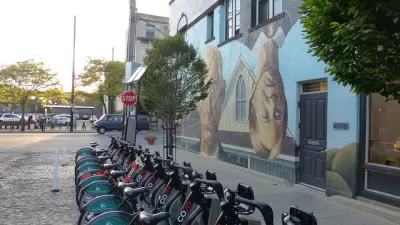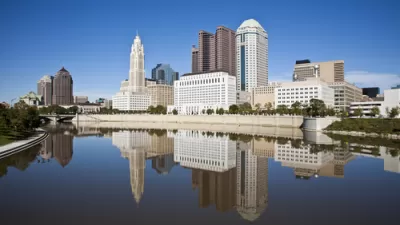The U.S Department of Transportation's Smart Cities Challenge will provide funding for seven finalists to further develop proposals to develop high-tech transportation solutions.

Alissa Walker reports on the announcement of seven finalists in the U.S. Department of Transportation's "Smart Cities Challenge." The seven finalists announced over the weekend "will receive $100,000 each and work closely with the USDOT and a group of partners to streamline their proposals," according to Walker. Eventually, one city will receive up to $40 million to fund their strategy from the U.S. DOT, and an additional $10 million from Microsoft co-founder Paul Allen's company Vulcan. Walker's article includes more background on the competition so far, as well as next steps for the finalists.
U.S. DOT Secretary Anthony Foxx announced the following competition finalists:
- Austin, Texas
- Columbus, Ohio
- Denver, Colorado
- Kansas City, Missouri
- Pittsburgh, Pennsylvania
- Portland, Oregon
- San Francisco, California
The announcement took place at the South By Southwest Interactive festival taking place in Austin. The festival and the news about the competition attracted news about the finalists from other publications. Tim Stevens reports for CNET on the finalists. Tom Knox reports for the Columbus Business Journal on the details of the proposals that got Columbus into the final group. Austin Mayor Mayor Steve Adler also sent a press release celebrating his city's inclusion among the finalists.
Just a month ago, the U.S. DOT was spreading news about the large response to the competition, after 77 cities submitted competition proposals. The large number of submissions compelled the U.S. DOT to announce seven finalists—two more than the originally intended five finalists.
FULL STORY: These 7 American Cities Will Compete for $40 Million to Create Transportation Utopias

Alabama: Trump Terminates Settlements for Black Communities Harmed By Raw Sewage
Trump deemed the landmark civil rights agreement “illegal DEI and environmental justice policy.”

Study: Maui’s Plan to Convert Vacation Rentals to Long-Term Housing Could Cause Nearly $1 Billion Economic Loss
The plan would reduce visitor accommodation by 25% resulting in 1,900 jobs lost.

Planetizen Federal Action Tracker
A weekly monitor of how Trump’s orders and actions are impacting planners and planning in America.

DC Extends Application Window for Outdoor Dining Permits
District restaurants will have until the end of November to apply, but businesses with permits in rush hour parking lanes must end operations on July 31.

Wind Energy on the Rise Despite Federal Policy Reversal
The Trump administration is revoking federal support for renewable energy, but demand for new projects continues unabated.

Passengers Flock to Caltrain After Electrification
The new electric trains are running faster and more reliably, leading to strong ridership growth on the Bay Area rail system.
Urban Design for Planners 1: Software Tools
This six-course series explores essential urban design concepts using open source software and equips planners with the tools they need to participate fully in the urban design process.
Planning for Universal Design
Learn the tools for implementing Universal Design in planning regulations.
Caltrans
Smith Gee Studio
Institute for Housing and Urban Development Studies (IHS)
City of Grandview
Harvard GSD Executive Education
Toledo-Lucas County Plan Commissions
Salt Lake City
NYU Wagner Graduate School of Public Service




























